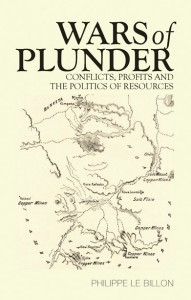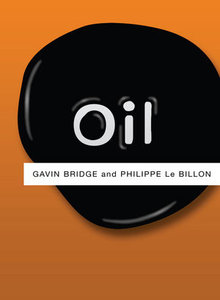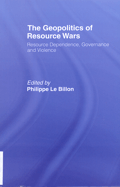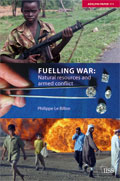Books
 A. Williams and P. Le Billon, eds. (2017) Corruption, Natural Resources and Development: From Resource Curse to Political Ecology. Cheltenham: Edward Elgar.
A. Williams and P. Le Billon, eds. (2017) Corruption, Natural Resources and Development: From Resource Curse to Political Ecology. Cheltenham: Edward Elgar.
Reflecting on recent debates in corruption research and revisiting resource curse challenges in light of political ecology approaches, this volume provides a series of nuanced and policy-relevant case studies analyzing patterns of corruption around natural resources and options to reach anti-corruption goals. The potential for new variations of the resource curse in the forest and urban land sectors and the effectiveness of anti-corruption policies in resource sectors are considered in depth. Corruption in oil, gas, mining, fisheries, biofuel, wildlife, forestry and urban land are all covered, and potential solutions discussed.
 P. Le Billon (2013). Wars of Plunder: Conflicts, Profits and the Politics of Resources. London, New York: Hurst and Oxford University Press.
P. Le Billon (2013). Wars of Plunder: Conflicts, Profits and the Politics of Resources. London, New York: Hurst and Oxford University Press.
From Angola and Liberia to Iraq and the Congo, wars have taken place in resource rich countries full of poor people. Wars of Plunder explores how resources have shaped recent conflicts, and what the international community has tried to do about it.
Focusing on key resources – oil, diamonds, and timber – resources and wars are linked in three main ways. First, resource revenues finance belligerents . Second, resource exploitation generates conflict. Third, economic shocks and poor governance sharply increase the risk of war (the ‘resource curse’).
 G. Bridge and P. Le Billon (2013; 2017 2nd ed.). Oil, Cambridge: Polity Press.
G. Bridge and P. Le Billon (2013; 2017 2nd ed.). Oil, Cambridge: Polity Press.
Oil politics in the twentieth century was about the management of abundance, state power and market growth. The legacy of this age includes declining conventional oil reserves, volatile prices, climate change, and enduring poverty in many oil rich countries. The oil sector is now in need of reform. Yet no one seems at the helm, leaving a vital source of energy at the whim of dictators, speculators and corporate operators, and our societies locked into unsustainable growth models.
As a new geopolitics of oil emerges, the need for effective global oil governance becomes imperative. Praising the growing influence of civil society and attentive to the institutionalization of producer-consumer cooperation, this book identifies challenges and opportunities to curtail price volatility, curb demand and the growth of dirty oil, de-carbonise energy systems, and improve governance in oil producing countries.
 P. Le Billon, ed. (2005), Geopolitics of Resource Wars: Resource Dependence, Governance and Violence. London: Frank Cass, 288pp.
P. Le Billon, ed. (2005), Geopolitics of Resource Wars: Resource Dependence, Governance and Violence. London: Frank Cass, 288pp.
Highlighting the multiple forms of violence accompanying the history of resources exploitation and current business practices supporting predatory regimes, insurgent groups and terrorists, this book provides fresh and in-depth perspectives on so-called ‘resource wars’. The book includes conceptual chapters and covers a wide range of case studies including the geopolitics of oil control in the Middle East, Central Asia and Columbia, spaces of governance and ‘petro-violence’ in Nigeria and ‘blood diamonds’ and other minerals associated with conflicts in Sierra Leone and the Congo.
This book is a special issue of the journal Geopolitics.
 Fuelling War: Natural Resources and Armed conflicts, Adelphi Paper 373. (London: Routledge for IISS), draft for comments. [PDF available]
Fuelling War: Natural Resources and Armed conflicts, Adelphi Paper 373. (London: Routledge for IISS), draft for comments. [PDF available]
A generous endowment of natural resources should favour rapid economic and social development. The experience of countries like Angola and Iraq, however, suggests that resource wealth often proves a curse rather than a blessing. Billions of dollars from resource exploitation benefit repressive regimes and rebel groups, at a massive cost for local populations. This Adelphi Paper analyses the economic and political vulnerability of resource-dependent countries; assesses how resources influence the likelihood and course of conflicts; and discusses current initiatives to improve resource governance in the interest of peace.
It concludes that long-term stability in resource-exporting regions will depend on their developmental outcomes, and calls for a broad reform agenda prioritising the basic needs and security of local populations.
Selected articles
Extractive Industries and Poverty: A Review of Recent Findings and Linkage Mechanisms, Extractive Industries and Society 2(1), 2015, 162-176 (with J. Gamu and S.J. Spiegel).
Foreign Aid, Resource Rents, and State Fragility in Mozambique and Angola, Annals of the American Academy of Political and Social Science 656(1), 2014, 79-96 (with H. Pérez Niño).
The ‘Global Food Crisis’ and the Geopolitics of Food Security”, Geopolitics. 19(2), 2014, 239-265 (with M. Sommerville and M., J. Essex).
Le Billon, P. (2014) “Natural resources and corruption in post-war transitions: Matters of trust”, Third World Quarterly. 35: 770-786.
Is Fairtrade certification greening agricultural practices? An analysis of Fairtrade environmental standards in Rwanda, Journal of Rural Studies, 32, 2013, 264–274 (with S. Elder and H. Zerriffi).
Effects of Fair Trade certification on social capital: The case of Rwandan coffee producers, World Development 40(11), 2012, 2355–2367 (with S. Elder and H. Zerriffi).
Landscapes of political memories: War legacies and land negotiations in Laos, Political Geography, Political Geography 31(5), 2012, 290-300 (with I. Baird).
China’s weapons trade: from ships of shame to the ethics of global resistance, International Affairs 85(2), 2009, 323-346 (with S.J. Spiegel).
Diamond Wars? Conflict diamonds and geographies of resource wars, Annals of the Association of American Geographers 98(2), 2008, 345-372.
Peace in the wake of disaster? Secessionist conflicts with the 2004 Indian Ocean tsunami, Transactions of the Institute of British Geographers 32, 2007, 411-427 (with A. Waizenegger).
Corruption: reconstruction and oil governance in Iraq, Third World Quarterly 26(4), 2005, 679-698.
Buying Peace or Fuelling War: the Role of Corruption in Armed Conflicts, Journal of International Development 15(4), 2003, 413-26. [PDF available]
The Political Ecology of War: Natural Resources and Armed Conflicts, Political Geography 20(5), 2001, 561-584. [PDF available]
Finance in Conflict and Reconstruction, Journal of International Development 13, 2001, 951-64, (with T. Addison and M. Murshed).
Policy Papers
Volatile Commodities: A Review of Conflicts and Security Issues Related to Extractive Sectors. Philippe Le Billon, Jonathan Kishen Gamu, Martha Condé. SSHRC Knowledge Synthesis Grant. [PDF link]
Extractive sectors and illicit financial flows: What role for revenue governance initiatives? Bergen: Chr. Michelsen Institute (U4 Issue 2011:13), [PDF link]
Resources for peace. Ottawa: Peabuild (with C. de Freitas, 2011), [PDF link]
The Political Economy of War: What Relief Agencies Need to Know. Humanitarian Practice Network paper no. 33 (with Joanna Macrae, Nick Leader and Roger East, London: Overseas Development Institute, 2000). [PDF link]